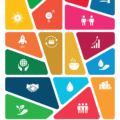Making climate scenarios more accessible

© Senses (2020), Climate Change Scenario Primer
Climate scenarios have featured in scientific studies for many years. Primarily based on computer simulations, they are however rather complicated and results are scattered across scientific publications. In an effort to help policymakers base their decisions on the best information available, IIASA researchers and colleagues at a number of other institutions have developed tools to help non-scientists understand and communicate climate change scenarios.
The SENSES platform is the first of its kind to provide the tools to use scenarios ranging from climate impacts to mitigation and energy options to a broader public beyond science. The platform offers a new way to access these scenarios so people can see for themselves what is at stake, and can base their decisions on the best information available. The scenarios can help policymakers and businesses, finance actors, and civil society alike to assess the threat of global warming and ways to limit it. The SENSES project (climate change ScENario ServicES) is part of the official European Research Area for Climate Services, supported by national ministries and the EU.
The NGFS Scenario Explorer, in turn, will enable financial specialists to work with scenario data. It hosts a set of transition scenario results selected for the Network for Greening the Financial System (NGFS) – a group of 66 central banks and supervisors around the globe who take an active interest in advancing the transition toward a sustainable world economy. The scenarios explore future changes to the energy system and the global economy if climate targets are met or not, and whether the transition to a low-carbon future happens in an orderly or disorderly fashion. The set of scenarios will inform the climate stress tests that key central banks like the Bank of England or the Banque de France are planning to apply to the financial institutions they regulate.
Finding solutions to tackle the climate challenge is something we can only do together. It is clear that the process needs to include many different voices and perspectives and enabling decision makers to use climate scenarios from science is one important element. These tools are the first step in providing a new form of climate service – climate change scenario services.





